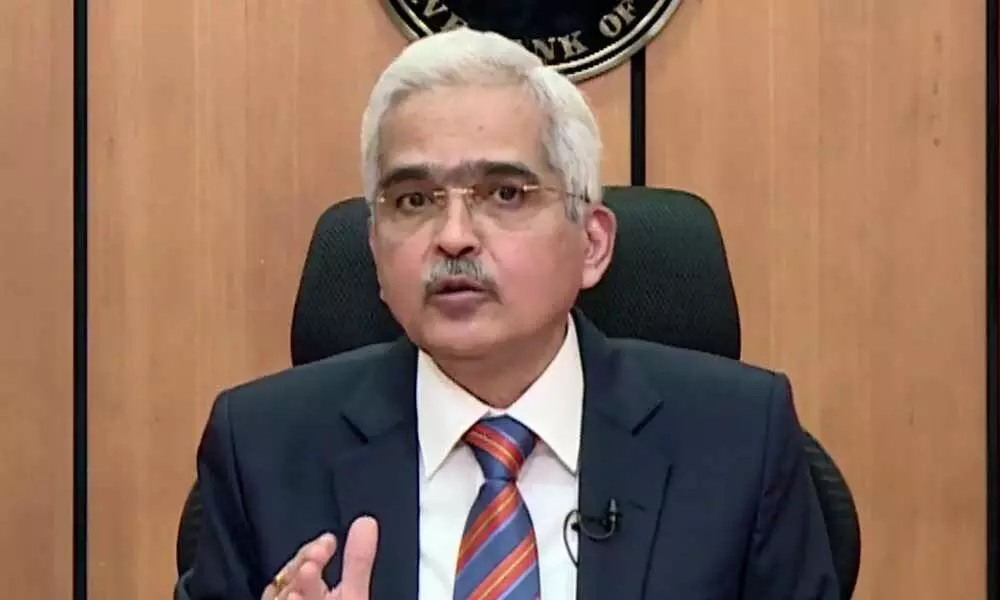Accommodative RBI
Keeps rates unchanged amid Covid surge; key repo rate stays at 4%
image for illustrative purpose

- Lockdowns could delay return to normalcy
- Liquidity will continue to remain in surplus
- Upside, downside pressures on inflation
The recent surge in infections has, however, imparted greater uncertainty to the outlook and needs to be closely watched as localised and regional lockdowns could dampen the recent improvement in demand conditions - Shaktikanta Das, Governor
Mumbai: The Reserve Bank of India (RBI) on Wednesday kept key interest rates unchanged at record lows while pledging to buy Rs 1 lakh crore of government bonds this quarter to cap borrowing costs in a bid to support an economy facing a resurgence of the pandemic.
In the first monetary policy of the 2021-22 fiscal, the central bank stuck to its accommodative stance as long as necessary, amid concerns of rising infections that could derail the nascent economic recovery. RBI's key lending rate, the repo rate, which was cut by a total of 115 basis points last year to soften the blow from the pandemic, will stay at 4 per cent while the reverse repo rate or the central bank's borrowing rate will be unchanged at 3.35 per cent.
Governor Shaktikanta Das said the six-member monetary policy committee (MPC) voted unanimously "to continue with the accommodative stance as long as necessary to sustain growth on a durable basis and continue to mitigate the impact of Covid-19 on the economy while ensuring that inflation remains within the target going forward."
Just as the economy started to recover after being pummelled by the pandemic and the lockdowns, India is witnessing a record jump in Covid-19 infections, threatening the nascent recovery. "The recent surge in infections has, however, imparted greater uncertainty to the outlook and needs to be closely watched, especially as localised and regional lockdowns could dampen the recent improvement in demand conditions and delay the return of normalcy," he said.
The Governor announced a second market G-sec acquisition programme or G-SAP 1.0 wherein RBI committed to open market purchase of government securities. In April-June, it is committed to buy Rs 1 lakh crore bonds, with first debt purchases starting from April 15. RBI had bought Rs 3 lakh crore of bonds in the last fiscal (2020-21) and planned similar or more spending in the financial year April 2021 to March 2022.
Das reiterated that the banking system liquidity will continue to remain in surplus even after meeting all requirements of the financial market segments and productive sectors of the economy. An accommodative stance implies a rate cut in the future if the need arises to support the economy. This is the fifth time in a row that MPC has decided to keep the policy rate unchanged. RBI had last revised its policy rate on May 22, 2020, in an off-policy cycle to perk up demand by cutting interest rates to a historic low. He assured that RBI is committed to ensuring ample system liquidity in consonance with the accommodative stance of MPC. "When I say ample liquidity, I mean a level of liquidity that would keep the system in surplus even after meeting the requirements of all financial market segments and the productive sectors of the economy," he said.
The Reserve Bank will of course continue to do whatever it takes to preserve financial stability and to insulate domestic financial markets from global spillovers and the consequent volatility, Das added
Das further said that to nurture the still-nascent growth impulses, it is felt necessary to support the continued flow of credit to the real economy. Accordingly, liquidity support of Rs 50,000 crore for fresh lending during 2021-22 will be provided to All India Financial Institutions (AIFIs).

